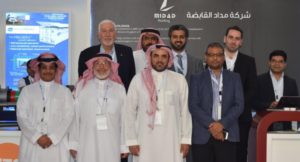Water scarcity in the Middle East and North Africa (MENA) region is a particular worry as the the region relies on water from outside the region (e.g. in the form of its food imports) and as on its own, limited and over-used ground water resources. Water issues will impact the region’s social and economic potential, increase potential for regional conflicts and increase land vulnerability to salinization and desertification. Wastewater reuse in Saudi Arabia can be a valuable option and provide a valuable wastewater resource if appropriate technologies are selected.
[embedyt] https://www.youtube.com/watch?v=zf75pJ6mBo0[/embedyt]
There are many advantages to wastewater reuse in countries that have limited fresh water access. The most significant advantages are the reduction of discharge into aquatic environments, nutrient rich wastewaters can provide larger crop yields in water poor regions, and the turn around times as well as the cost associated to get wastewater to a quality that can be reused is relatively low in comparison to trying to treat the wastewater to potable standards. The reduction in the use of potable water for irrigation offers significant upside in terms of both energetics and economics.
Wastewater, contrary to it’s nomenclature, is considered an asset in Saudi Arabia (MoWE).
>72% of wastewater is reused for various applications on a large scale across Saudi Arabia and they have plans to further increase that number to >90% reuse. As it stands, the bulk of wastewater reuse is happening in centralized settings on operations where wastewater production >500m2 / day of wastewater. The urban population of Saudi Arabia is 26,219,511, making up 83% of the population.
Source: https://tradingeconomics.com/saudi-arabia/urban-population-wb-data.html
The rural population of Saudi Arabia is 5,320,861 making up the remaining 17% of the population. There are smaller towns and villages spread throughout with smaller operations with flows <500m2/day that need to be addressed for reuse. This is where nutrient rich wastewater can significantly improve crop yields in water poor regions of Saudi Arabia and reduce the stress on the potable water supplies.
Source: https://tradingeconomics.com/saudi-arabia/rural-population-percent-of-total-population-wb-data.html
In Saudi Arabia, allowable effluent quality for crop irrigation is as follows:
| Parameter |
Monthly (mg/L) |
Weekly | Anytime (mg/L) |
| TSS | 10mg/L | 15 mg/L | N/A |
| BOD5 | 10 mg/L | 15 mg/L | N/A |
| Fecal Coliform | N/A | 2.2MPN | 23 MPN |
Source: MOWE
Island Water Technologies provides REGEN – a mobile packaged wastewater treatment system that does not require process additives for operation (coagulants / flocculants / Chlorine). This is a cost savings for adequate treatment and it significantly reduces the strain on potable water resources.
A modular, wastewater treatment facility would be an ideal candidate for rural settings to achieve key effluent standards and reuse wastewater to irrigate crops. A plug n play wastewater treatment facility that is fully solar powered, achieving effluent quality standards of 15/15 TSS/BOD, equipped with UV disinfection.

Midad Holdings
IWT works with Midad Holdings (http://www.midadholdings.com/) for all projects in Saudi Arabia.


